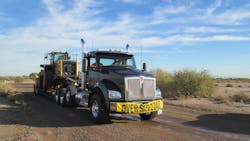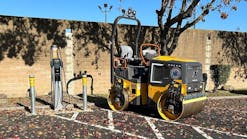As Covid-19 restrictions are being lifted across most states in the country and with warm weather upon us, it is important for truck drivers to consider proper management of Diesel Exhaust Fluid (DEF) used in most diesel-powered trucks.
DEF is made from a mixture of technically pure urea and purified water, and must be handled and stored properly to preserve its quality. Handling and storing DEF in warm weather requires special care to protect it from the impact of high temperatures which can decrease its useful life. Now with the need for added safety in public places, dispensing DEF at service stations will require extra care.
Harmening is manager, EOLCS/DEF/MOM, American Petroleum Institute.
We want to be sure that truck drivers on the road and people working in shops are safe, so the American Petroleum Institute (API) has developed several tips for drivers on the road and for shop owners to help them purchase high-quality DEF in a safe manner and to handle and store it so as to protect it during warm weather months.
Purchasing DEF at a service station
On the road, one of the main challenges for drivers is knowing the actual brand of DEF they are being sold. While regulations in many states require identifying the manufacturer and brand on receipts, some locations do not include it. API recommends purchasing DEF that is clearly identified at the fill-up location.
In addition, drivers accustomed to purchasing DEF in containers should look at the expiration date if it’s printed on the bottle and be sure to use it before this date as the product has a limited shelf life. If an expiration date is not present, look at the traceability code for a date.
This date is usually equivalent to the packaging date. As a last resort, ask for the most recently delivered DEF products. Storage conditions also have an impact on its quality. DEF can be expected to have a minimum shelf life of 12 months or even longer in optimum conditions.
Safely dispensing DEF
As many gas station and truck stop owners around the country have taken steps to increase the cleaning frequency of the high-touch points, there are recommended practices to help everyone protect themselves at the pump. Consider the following when dispensing DEF or fuel:
- Follow the CDC’s recommendations to clean your hands often, practice social distancing and wear face coverings.
- Consider using gloves or paper towels while touching surfaces.
- Carry hand sanitizer or sanitizing wipes with you and use them both before and after fueling.
DEF storage in a vehicle
Check the label on the bottle for recommended storage temperatures and be sure to look for the API certification mark as well. API recommends that you don’t store DEF for too long in a truck, especially if the storage area in the vehicle is routinely hotter than the recommended storage temperatures displayed on the label.
DEF stored at 86 degrees and above will only last about six months. Exposure to direct sunlight may also decrease the life DEF.
Purchasing DEF for shop use
API has found that the biggest misconception by fleet managers is the belief that if the urea concentration of their DEF is on spec, then the DEF meets the required quality. Though it is true that the concentration is very important, there are many other important quality characteristics built into the ISO 22241 specification in regard to DEF.
Fleet managers responsible for procuring DEF should confirm that their suppliers are providing DEF that meets the ISO quality standard. One way to do this is to ensure that their supplier is providing a Certificate of Analysis (or Quality) with every shipment that addresses all of the quality characteristics that the specification requires.
Purchasing API-licensed DEF is the best way to be sure your DEF meets the rigorous requirements of the specification, because these products are not only tested before they are released to the marketplace, but they are also subject to testing in API’s Aftermarket Audit Program. Fleets and drivers can always check to see if the DEF they are buying is licensed by visiting API’s real-time directory of licensees on the API website.
Managing DEF in shops
For shops, the handling, storage and dispensing of DEF is very important so that off-spec DEF doesn’t reach the marketplace. Temperature during transport or at the point of storage or sale can harm the shelf life of DEF sold in containers.
Make sure the stock is rotated to use the oldest product first. Proper storage temperatures in a shop is also vital. Storing in temperatures above 86 degrees Fahrenheit will limit the shelf life of the DEF over time. Some additional things to consider in storing and handing DEF include the following:
- Bulk storage tanks should be dedicated for DEF. Don’t switch products in the bulk tank without thoroughly rinsing the tank with distilled or de-ionized water or on-spec DEF.
- A closed loop system for transferring DEF from a drum or bulk tank is recommended so contaminants don’t get into the DEF. This is particularly important in a shop or construction site that has dust or dirt in the air.
- Use dedicated equipment for dispensing DEF. Don’t use funnels, pitchers, hoses, etc., that are used for other fluids when putting DEF in a tank.
- Anything used for dispensing DEF should be cleaned with distilled or de-ionized water and followed by a DEF rinse. Don’t use tap water for cleaning.
For shops and drivers, it’s important to know what you are putting into your DEF tank. The quality of the DEF going into your vehicle is as important as the quality of the engine oils or fuels used in your vehicles. Use of API-licensed Diesel Exhaust Fluid will ensure that the DEF meets the high standards required by engine and vehicle manufacturers.





